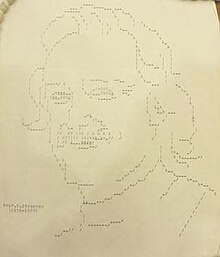Christopher Strachey
| Christopher Strachey | |
|---|---|

Early computer printout of Christopher Strachey
|
|
| Born |
16 November 1916 Hampstead, England |
| Died | 18 May 1975 (aged 58) Oxford, England |
| Residence | UK |
| Citizenship | UK |
| Fields | Computer Science |
| Institutions |
University of Cambridge, University of Oxford |
| Alma mater | King's College, Cambridge |
| Doctoral students | Peter Mosses |
| Known for | CPL, denotational semantics, Fundamental Concepts in Programming Languages |
Christopher S. Strachey (/ˈstreɪtʃi/; 16 November 1916 – 18 May 1975) was a British computer scientist. He was one of the founders of denotational semantics, and a pioneer in programming language design. He was a member of the Strachey family, prominent in government, arts, administration, and academia.
Christopher Strachey was born on 16 November 1916 to Oliver Strachey and Rachel (Ray) Costelloe in Hampstead, England. Oliver Strachey was the son of Richard Strachey and the great grandson of Sir Henry Strachey, 1st Baronet. His elder sister was the writer Barbara Strachey. In 1919, the family moved to 51 Gordon Square. The Stracheys belonged to the Bloomsbury Group whose members included Virginia Woolf, John Maynard Keynes and Christopher's uncle Lytton Strachey. At 13, Christopher went to Gresham's School, Holt where he showed signs of brilliance but in general performed poorly. He was admitted to King's College, Cambridge (the same college as Alan Turing) in 1935 where he continued to neglect his studies. Strachey studied mathematics and then transferred to physics. At the end of his third year at Cambridge, Strachey suffered a nervous breakdown, possibly related to coming to terms with his homosexuality. He returned to Cambridge but managed only a "lower second" in the Natural Sciences Tripos.
...
Wikipedia
